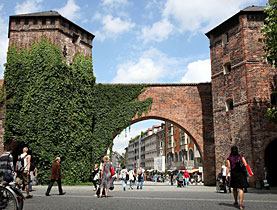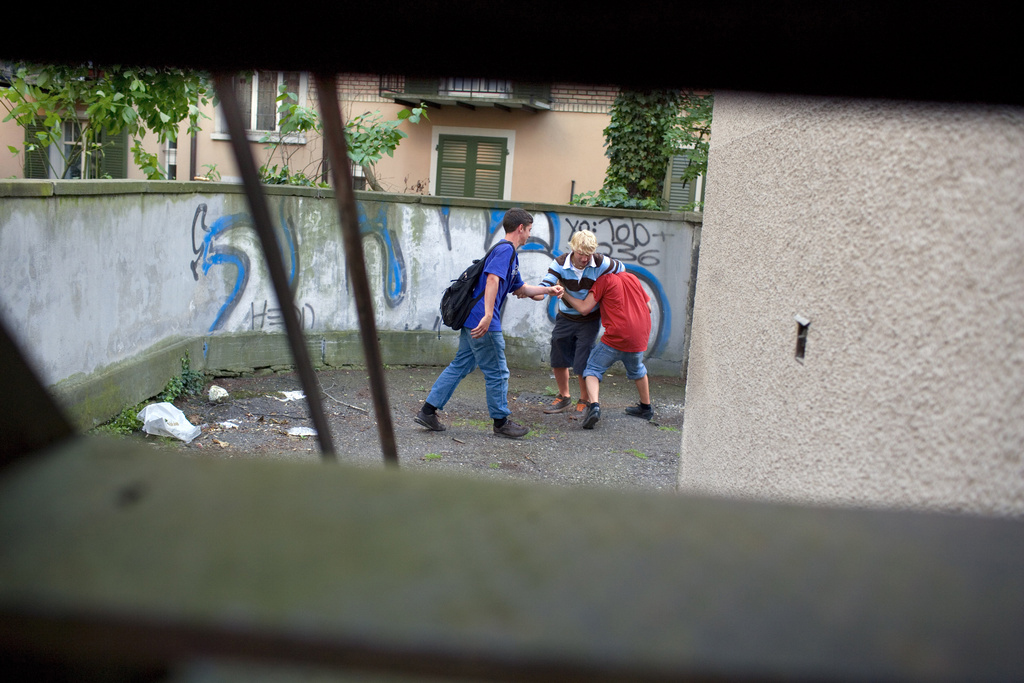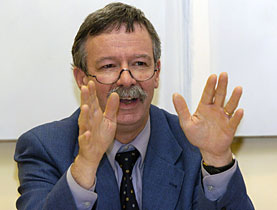Teens stand trial over Munich attack

The German trial of three Swiss teenagers accused of brutally attacking randomly selected people in Munich last summer is set to begin on Monday.
Front-page news at the time, the event spurred calls by a shocked public on both sides of the border for a clampdown on juvenile violence.
Within the space of half an hour during the early hours of July 1 the Zurich youths, who were visiting Munich on a school outing, physically assaulted five men, one of whom was handicapped. One man was trampled almost to death.
“We just wanted to have a little fun,” one of the teens said later.
A media sensation in Germany and Switzerland, the incident generated countless articles, analyses and letters to the newspapers about why such senseless violence occurs, who ultimately bears responsibility for it and the roles of parents and schools in educating the young.
swissinfo.ch’s German-language blog, “The Swiss and the Germans”, received hundreds of responses on the incident within a very short period. Many railed against permissive justice and mollycoddling, calling for the toughest possible punishment to be meted out.
Shockwave
“This sent a huge shockwave throughout the Swiss community here,” said the Swiss consul general in Munich, Ursula Aaroe.
“The consulate was swamped with questions from journalists asking how teenagers from Switzerland could do something like this. None of us in Munich ever expected that something like this could happen with young people from our country.”
Albert J. Küng of the Swiss club in Munich said: “Everyone was shocked by the senseless violence and brutality.”
He noted that the attacks took place amid a backdrop of tense German-Swiss relations due to a tax dispute and unflattering remarks by the German finance minister about the Swiss.
“The media furore subsided after two weeks, but this was largely because events overtook the situation,” he said. “Shortly afterwards, a similar case, this time involving German teenagers in Munich, resulted in a death.”
Tough justice
The three Swiss youths have spent almost eight months in remand, which is considered a long time, according to Hans-Kurt Hertel, spokesperson for the Munich court of appeal.
He told swissinfo.ch that the investigation and the gathering of a series of expert assessments had proved very time-consuming. Several issues required cross-border legal assistance from Switzerland.
Thomas Steinkraus-Koch from the Munich prosecutor’s office said they expected a sentence would be handed out at the end of the trial.
The public will be excluded from the proceedings owing to the accused being under 18 at the time of the incident. The parents of the accused, but not journalists, will be allowed to attend, Hertel said.
He added that the authorities must “walk a tightrope, balancing the right to information – also from Switzerland – against the obligation to protect the youths”.
Lack of sympathy
The teenagers have been charged with attempted murder and intent to inflict grievous bodily harm. German juvenile law permits youth offenders to be imprisoned for up to ten years, considerably longer than is possible under Swiss law, which stipulates a maximum sentence of four years for underage offenders.
Aaroe believes public opinion in Munich supports a hard line.
“Lots of people are calling for the maximum sentence. And because of subsequent incidents of youth violence the Swiss teenagers cannot reckon with much sympathy,” she said.
Hertel said he could imagine there was speculation behind the scenes as to whether the sentences – if pronounced – could under certain circumstances be served in Switzerland.
In this case the defendants’ lawyer would need to submit a request for transfer. However, it is not possible to find out if such a request has been submitted prior to sentencing.
Consular protection
The accused have had two visits from the Swiss consulate, the first of which came at the very beginning of their incarceration.
“Our task is to ascertain whether the accused are being well-treated, whether they have legal representation and whether the detention conditions are correct,” Aaroe said, adding that what happened that night was not discussed.
Because everything was proceeding normally and communication with the German authorities is good, there was no need at present to negotiate, she said.
But that could well change should the three Swiss be sentenced.
Gaby Ochsenbein, swissinfo.ch
(Translated from German by Kathleen Peters)
The three 16-year-olds from canton Zurich have previous criminal records in Switzerland.
One of the accused was sentenced for theft and unlawful entry, a second for inflicting bodily harm, and the third for assault and attempted robbery.
According to the Zurich juvenile public prosecutor’s office these investigations are closed. The teenagers were sentenced to community service of between nine days and four weeks for their crimes. Therapy was ordered for one of the three in September 2008.
The three are accused of attacking three unemployed men in a Munich park, one of whom was physically handicapped, in the early hours of July 1. Afterwards they pounded a German businessman almost to death. On the way home to their lodgings they attacked a student.
The teenagers had drunk alcohol (less than one per mill) and smoked a joint beforehand.
According to a Federal Police Office report, there are around 500 young serious and repeat offenders in Switzerland.
Most are young men with immigration backgrounds – most commonly from the Balkans and Turkey – who often join ethnically mixed gangs. They have difficult relationships with their family, school, work and drugs.
In French-speaking Switzerland, police also talk of problems with people from north Africa and other isolated countries in Africa.
Female gangs appear to be exceptional. One area that is not disputed by experts is the qualitative shift in youth criminality in recent years – above all the increased viciousness of attacks and the increased intensity of delinquency by individuals.

In compliance with the JTI standards
More: SWI swissinfo.ch certified by the Journalism Trust Initiative















You can find an overview of ongoing debates with our journalists here . Please join us!
If you want to start a conversation about a topic raised in this article or want to report factual errors, email us at english@swissinfo.ch.